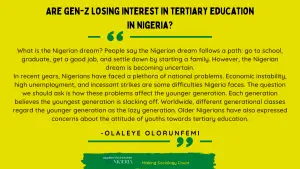As the much anticipated 2023 election which happens to be the most talked about has come and is finally over, the people of Nigeria were once again faced with the reality of another election cycle. However, the just concluded election posed a unique challenge to the country as it took place at a time when the country is grappling with numerous challenges. Which include tribal and religious battles, without leaving out insecurity.
Nigeria is a peaceful country until religion and tribalism come to play. With these challenges, there’s been a growing concern among Nigerians about the possibility of the country’s continuous peaceful coexistence after the eventful election.

Tribal and religious battles
Tribal War
Tribalism has been a major issue in Nigeria for decades. The country is home to over 250 ethnic groups, each with its unique culture and traditions. Unfortunately, these differences have often led to conflicts, which have at times led to tribal clashes with scores of people losing their lives. In recent years, the country has witnessed an increase in tribal tensions, which have been fueled by political and economic interests. The election exacerbated these tensions as politicians leveraged the differences between the various ethnic groups to gain an advantage.
The elections which took place in February and March 2023 saw the height of tribal animosity between Nigerians. Especially from the Southeastern and Southwestern parts of the country (Igbo and Yoruba). This was so as both ethnic groups had strong candidates vying for the presidential seat which wasn’t a problem for most citizens. Until some political actors started instigating hatred through comments and opinions to create hatred in the heart of the people. The citizens in a bid to protect and fight for their tribe were caught up in a battle they had never planned for from the beginning.
The social media platforms are the places where tribal hate was sponsored and the battle on the platforms, especially on Twitter was unbearable. For the most part of the election period, there was some kind of internet war between the Igbos and the Yorubas on a daily basis with each person trying to defend their candidate and the tribe they represent. At this time, a lot of hate speech towards the other tribe was shared, and wrong accusations and misinformation to discredit the other tribe were disseminated.
Religious War
The ruling party decided to vie for the seat with candidates that belongs to the same religion at the election which they eventually won according to the electoral umpire, the Independent National Electoral Commission (INEC). But the same religious move was rejected by citizens who think the party underrated the power of the other religions. This also didn’t sit well with other citizens who believed it was proof of the hidden attempt to Islamize the country. Nigeria is a country with a diverse religious population. People who belong to the Islamic and Christian religions make up about 70% – 80% of the country’s population while there are adherents of traditional African religions.
In a multi-religious and multi-ethnic society like Nigeria, political representation and power-sharing are often structured along religious and ethnic lines to ensure fairness and inclusivity. Thus, some Nigerians may view a Muslim-Muslim ticket as unrepresentative of the country’s religious diversity and exclusionary to non-Muslims. Additionally, after an eventful election that the ruling party won, there have been growing concerns about whether a government led by individuals from the same religious background can fairly represent the interests of all Nigerians.
Insecurity
Insecurity is another challenge that Nigeria is grappling with. The country has been plagued by various forms of insecurity, including terrorism, banditry, and kidnapping. These challenges have led to the loss of countless lives and have disrupted economic activities. The past election might directly or indirectly worsen the insecurity situation in the country as politicians had in different ways used thugs to disrupt the election process and intimidate voters from voting against them.
Against this backdrop, the question arises whether Nigeria can continue to exist peacefully after the election. The answer to this question is not straightforward. On the one hand, there are reasons to be optimistic. Nigeria has a history of peaceful transitions of power, which have been the envy of many countries in the region. Additionally, Nigerians are resilient people, and the country has often weathered many storms.
On the other hand, there are also reasons to be concerned. The tribal tensions and insecurity challenges facing the country are significant, and if not addressed, they could spiral out of control. Additionally, there is a growing sense of disillusionment among the people, particularly the youth, who are frustrated with the government’s inability to address the country’s numerous challenges. This disillusionment could manifest in the form of protests or violence, which could threaten the country’s stability.
To ensure that Nigeria continues to exist peacefully after the election, there are several things that the government and other stakeholders can do in the build-up to the next election which will be in 2027.
First, the government must take concrete steps to address the tribal tensions and insecurity challenges facing the country. This may involve reforming the security sector to make it more effective, addressing the root causes of tribal conflicts, and fostering national unity through dialogue and education.
Second, political parties and politicians must refrain from using divisive rhetoric that could inflame tribal tensions. Instead, they should focus on issues that affect all Nigerians, such as the economy and job creation.
Third, the media must play a responsible role in reporting on events or happenings. They should refrain from sensationalizing news that could inflame tensions and instead report accurately and objectively.
Finally, civil society organizations and religious leaders should engage with their communities to promote peace and unity. They should educate their followers on the need to embrace diversity and shun violence.
In conclusion, the recently concluded election in Nigeria posed a unique challenge to the country. The tribal tensions, religious battles, and insecurity challenges facing the country are significant, and there is a growing concern about the possibility of the country continuing to exist peacefully now that the election is over.
However, with the right actions from the government and other stakeholders, it is possible for Nigeria to overcome these challenges and continue to exist peacefully. The government must take concrete steps to address the root causes of tribal tensions and insecurity. While political parties and politicians must refrain from taking advantage of these sensitive factors for their selfish benefits and focus on issues that concern the country as a whole.




